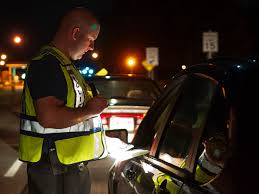What Are DUI Sobriety Checkpoints
Sobriety checkpoints, also known as DUI checkpoints, help police identify and arrest drivers who may be driving under the influence of alcohol or drugs. This practice of law enforcement is legal as long as it is done properly, said Tulsa DUI attorney Stephen Cale.
The following is for educational purposes, is not legal advice, and does not establish an attorney-client relationship. If the State has charged you or someone you know with DUI or any other crime, call the Cale Law Office at 918-277-4800. Or, you can contact us through the web. Your initial consultation is free.
Oklahoma DUI Checkpoint Law
Guidelines for DUI checkpoints in Oklahoma are based in part on the U.S. Supreme Court ruling in Michigan Department of State Police v. Sitz (1990). The court in that case found that these checkpoints did not violate the Fourth Amendment of the United States Constitution. That amendment protects people against unreasonable searches and seizures, as long as certain conditions are met.
But Tulsa DUI attorney Stephen Cale said that 17 years after the Michigan v. Sitz ruling, the Oklahoma Court of Criminal Appeals set out certain standards that law enforcement must abide by for legal checkpoints.
Based on the holdings in Lookingbill v. State, 2007 OK CR 7, 157 P.3d 130, a court will look at the following factors when determining the constitutionality of sobriety checkpoints in Oklahoma.
Standards for Legal DUI Checkpoints
1. Operational Guidelines
The law enforcement agency conducting the checkpoint “should have written standards for the conduct of such operations and policies in place to ensure compliance with those standards.” Lookingbill v. State.
So, when a criminal defense attorney challenges the legality of the checkpoint, the prosecution must introduce evidence of the law enforcement agency’s guideline governing the checkpoint. Challenging the constitutionality of the checkpoint may get evidence thrown out. If the Court agrees with the challenge, then charges stemming from the checkpoint could be dismissed.
2. Supervisory Authority
The decision to establish a sobriety checkpoint must be made by a high-ranking law enforcement official rather than individual officers on the ground.
3. Neutral and Articulable Basis
The checkpoint “must be rationally related to the stated public purpose.” Lookingbill v. State. Simply put, the checkpoint must have a specific purpose, such as combating drunk driving, based on objective evidence of the problem in the area where the checkpoint is set up. Checkpoints set up for general crime control purposes are not constitutional. For example, a checkpoint set up to detect evidence of ordinary criminal wrongdoing is unconstitutional. City of Indianapolis v. Edmond, 531 U.S. 32, 121 S.Ct. 447 (2000).
4. Compliance With Operational Guideline
“[T]he operation must be carried out in accordance with agency guidelines limiting officer discretion and assuring all motorists are treated equally.” Lookingbill v. State.
5. Time, Location And Duration
The checkpoint’s location and timing should be chosen in a way that maximizes its effectiveness in deterring drunk driving while minimizing the intrusion on motorists. So, a court will consider the time, location and duration of the individual stop.
6. Public Awareness
A court will also consider steps taken to inform the motorists of the reason for the stop, said Tulsa DUI attorney Stephen Cale. Oftentimes, a law enforcement agency will give advance notice of a checkpoint. This notice can be through various means, such as media announcements, social media or signage.
Working With The Cale Law Office
The Cale Law Office is dedicated to the practice of criminal defense and medical marijuana law. Our mission is to achieve the best possible results for our clients through hard work, attention to detail, and aggressive representation. This is done while maintaining the highest level of professionalism, integrity, and ethical standards. If you’re looking for a Tulsa DUI attorney, call the Cale Law Office at 918-277-4800. Your initial consultation is free.
Serving clients throughout Northeastern Oklahoma, including Tulsa, Washington, Nowata, Rogers, Craig, Okmulgee, Creek, Pawnee and Osage counties.

